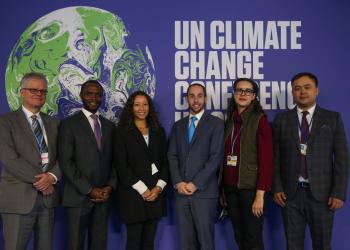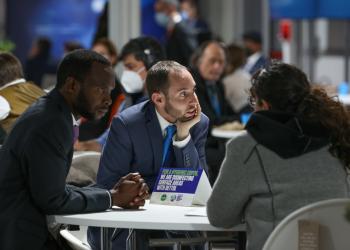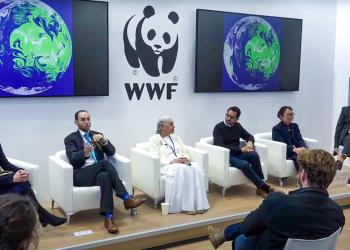BIC delegation joins climate discussions at COP 26
Baha’i International Community (BIC) delegates from around the world gathered at the recently concluded United Nations COP 26 climate conference in Glasgow, Scotland, to offer Baha’i perspectives on addressing climate change.
Central to the delegates’ efforts was a series of public appearances at conference side-events, and informal discussions with civil society actors and other figures, designed to explore how humanity can mitigate anthropogenic climate change and place an interconnected global civilization on a sound ecological footing.
“Confronting climate change demands higher levels of unity from the peoples and governments of the world,” said Daniel Perell, a representative of the BIC, who led the delegation.
“We have sufficient scientific evidence that shows the reality and risks of climate change. Now we need new approaches to state sovereignty and to our stewardship of the global commons that allow the international community to respond to the evidence,” Mr. Perell added.
Mr. Perell was joined by BIC delegates from Kazakhstan, Kenya, and the Netherlands. A number of other Baha’is also attended COP 26 as United Nations staffers, members of national delegations, and with civil society groups.
Among the activities and events the BIC delegates joined, Mr. Perell spoke on a panel organized by the World Wildlife Fund (WWF) entitled Climate and Nature: The Role of Faith-Based Organizations in Securing a Nature Positive World For All.
Mr. Perell explored how the concept of unity in diversity can help in a multilateral process such as climate negotiations. Mitigating climate change demands a united approach drawing on diverse insights and initiatives to succeed, he said.
“We often treat diversity as a source of competition,” Mr. Perell said at the WWF event. “If we see diversity as a source of strength, and the success of another country or another people as a victory for ourselves, it would be a great advancement.”
The Glasgow Baha’i community also participated in COP 26 activities – reflecting an understanding that global discussions need to be matched with local actions. Dr. Maureen Sier, a member of the Baha’i community who also serves as chair of Interfaith Scotland, presided over an interfaith prayer and meditation vigil for the success of the conference. The community also released an eco-pledge detailing commitments made by local Baha’is and inviting conversation on further efforts.
COP 26 brought together over 40,000 registered attendees, including 120 world leaders, civil society and climate activists, journalists and business leaders. The conference agreement captured notable developments on climate adaptation and mitigation efforts and Alok Sharma, President of COP 26, said in closing remarks that “We … have kept 1.5 degrees alive,” referring to the more ambitious temperature goal set by the 2015 Paris Agreement.
But Sharma added that the “pulse is weak” for the goal “and it will only survive if we keep our promises and translate commitments into rapid action.”
Reflecting on the conference outcomes, Mr. Perell said that changes in tone and urgency during the COP 26 discussions were especially pronounced.
“We noticed a shift before and during COP 26,” Mr. Perell said. “Climate change has, in the past, been a source of division in the international community, but now consensus is growing, as is the call for unified action for the betterment of all.” Reflecting this emerging consensus, and in light of the insufficiency of commitments made to date, UN Member-States have agreed to return with new commitments next year, rather than in 2025 as was initially proposed.
“If this were the end of the climate conversation, our earth systems would most certainly be at grave risk,” Mr. Perell said. “But considering the new groundswell of support and momentum coming from Glasgow, there is reason for optimism.”




